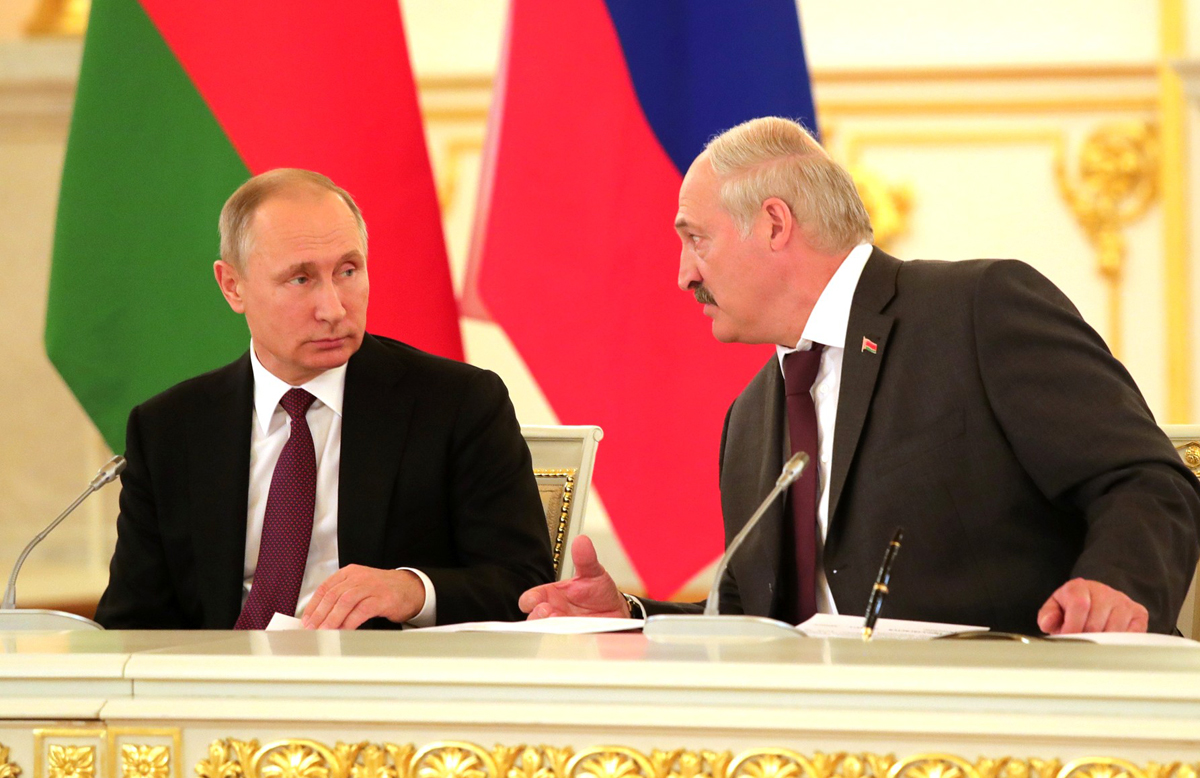
Belarus wary of increasingly authoritarian Russia
Analysis. Despite repeated assurances of commitment from President Alexander Lukashenka to the Belarus–Russia partnership, the relationship between the countries is far from unproblematic. The political stakes for Lukashenka are rising as Russia’s political system is becoming increasingly authoritarian, writes UI intern Anna Zotééva.
Publicerad: 2019-06-10
The Russian Federation and the Republic of Belarus have a long common history and share a common cultural background. Additionally, the two peoples can easily communicate since Russian is the first language in both countries. Despite numerous integration projects, the Russian–Belarusian bilateral relations seem to have deteriorated lately, which is reflected in statistics measuring how Belarus is perceived among Russians.
According to one census, the percentage of Russians who consider the relationship between Russia and Belarus to be good has decreased from 79 percent to 50 percent since 2015. Moreover, Belarus was considered an amicable state by fewer Russians in 2017 compared to 2014 (46 percent and 55 percent respectively). While the leaders of both countries try to portray the relationship as strategic and successful, it is evident that Moscow and Minsk have a number of issues on which they do not agree.
The integration process since 1991
Russia and Belarus are parties to a number of integration projects that have arisen in the post-Soviet time, such as the Customs Union (1995), the Union State Treaty (1999), the Eurasian Economic Community (2000) and finally the Eurasian Economic Union (EEU) (2015). Although the integration projects have achieved certain success, it seems that both parties act in accordance with their own interests rather than commit to the idea of deeper integration based on the EU-model.
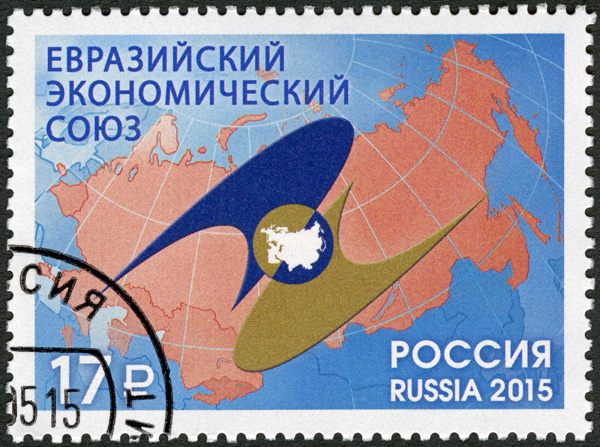 Russian stamp dedicated to the Eurasian Economic Union, 2015. Photo: Shutterstock
Russian stamp dedicated to the Eurasian Economic Union, 2015. Photo: Shutterstock
Russian-Belarusian relations have typically revolved around a number of key differences in perceived goals and the imbalance of power between the two nations: whereas Russia has focused on retaining Belarus in its sphere of influence, President Alexander Lukashenka has tried to gain as many benefits as possible from the cooperation with its powerful neighbor.
Lately, a new meaningful factor in the power play between Russia and Belarus has emerged. With the annexation of Crimea and the EU sanctions against Russia, the security situation in Europe has changed dramatically, which has resulted in a more wary Belarusian attitude towards Russia. Despite Lukashenka’s repeated assurances of commitment to the Russia–Belarus partnership and claims that the Russian–Belarusian union has a “special value”, the relationship between the countries is far from unproblematic. Lukashenka does not miss an opportunity to remind Russia that Belarus is its last ally in Europe and alludes to a potential rapprochement to the EU and NATO.
Although Russia and Belarus formally have a common foreign policy, Minsk has not recognized Russian sovereignty over Crimea, stating that it is sufficient to recognize the “de facto” reality. In foreign policy Belarus has assumed the role of mediator between Europe and Russia by hosting negotiations on the Donbass issue in Minsk.
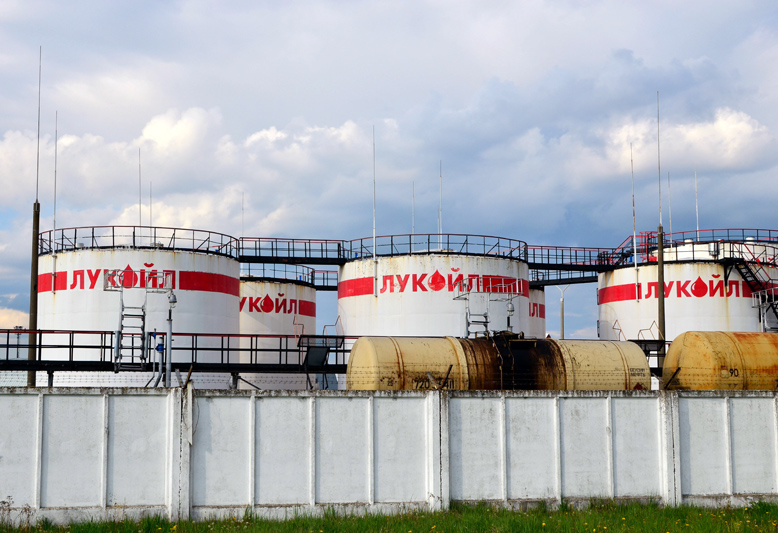 Oil storage tanks of the Russian oil company Lukoil in Minsk. Photo: Shutterstock
Oil storage tanks of the Russian oil company Lukoil in Minsk. Photo: Shutterstock
One reason for the recent Russia–Belarus alienation is the declining Russian economy. For Belarus, one of the crucial issues has been an integrated energy policy. The failure to establish a common energy market has made the prospect of integration with Russia much less appealing to President Lukashenka. In 2016–2018 Russia and Belarus engaged in a range of discussions on oil and gas prices, thoroughly documented in the media. On the summit of April 3, 2017 the presidents of Russia and Belarus agreed on “the principles for cooperation in the oil and gas field until 2019”. The parties also consented to sign a treaty on the establishment of a unified gas market in EEU in 2024. However, the conflict between Russia and Belarus on oil and gas supplies continued and culminated by the end of 2018.
During previous disagreements it was usually Minsk that played the political card, threatening to withdraw from the integration process with Russia. However, during the latest energy crisis, Russia demanded that Belarus commit to “advanced integration”, i.e. a monetary union, a joint customs authority, a court and an audit office, as stipulated by the Union State Treaty from 1999. This idea was interpreted by Lukashenka as a threat to Belarus’ national sovereignty and an intent to incorporate Belarus into Russia.
Is there a threat to Belarus’ sovereignty?
The fear that Belarus may lose its sovereignty has certain grounds. An important factor is the “2024 problem”, i.e. finding a way for Vladimir Putin to stay in power after his last constitutional period ends in 2024. It has been speculated that, in order to solve the “2024 problem”, Russia and Belarus could merge to form a new state, possibly adopting a new constitution. Putin would then be eligible for running for presidency, as this would count as his first term in this newly formed state. Although Kremlin spokesman Dmitry Peskov dismissed these ideas as having nothing to do with reality, Russian media claim that this possibility is being discussed in the Kremlin.
It is apparent that Lukashenka is not keen on such a solution. Since 2015 he has declared numerous times that the sovereignty of Belarus should be respected notwithstanding the close ties between the people of Belarus and Russia.
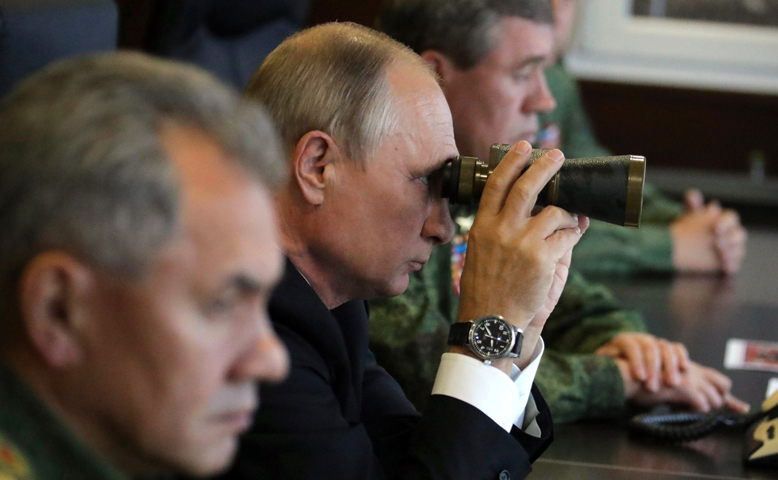 President Putin during the main stage of the Zapad-2017 joint Russian-Belarusian strategic exercises. Photo: Kremlin.ru
President Putin during the main stage of the Zapad-2017 joint Russian-Belarusian strategic exercises. Photo: Kremlin.ru
The cooperation with Russia in this new political reality is more dangerous for Belarus, causing Minsk to look for other opportunities and partners. While Putin seems to be replacing Lukashenka as the most notorious dictator in Europe in the views of EU leaders, the relationship between Belarus and the EU is softening, which has resulted in the EU lifting personal sanctions against Lukashenka. Sanctions against 170 Belarusian citizens and a number of companies were also lifted after having been in force for over 13 years.
Belarus in turn participated in the Universal Periodic Review, allowing an international body to assess the human rights situation in the country. However, one should not forget that there are certain limits for Belarus in its aspirations for a closer cooperation with the EU due to the nature of the political regime in Belarus.
In summary, Lukashenka has been benefiting less from cooperation with Russia since the events in Ukraine in 2014. At the same time, the political stakes for him are rising as Russia’s political system is becoming increasingly authoritarian. As a consequence, the leaders of the two countries are unable to come to terms regarding deepened integration. As mentioned before, the ties between the people of Russia and Belarus are rather close. Does it mean that Belarusian people are positive towards a possible political union with Russia?
The attitude of the Belarusian people
The unification issue is closely tied to the notion of Belarusian national identity. The Belarusian and Russian languages are co-official in Belarus, but the majority of the population uses Russian as its main language for communication. Historically, Belarus was a land of two cultures: the Polish Catholic and the Russian Orthodox, and the local population identified with one of these cultures.
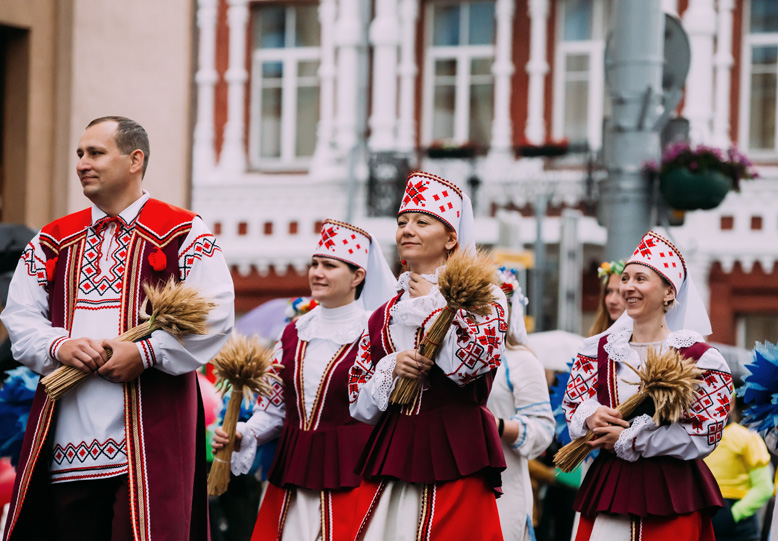 People in national traditional Belarusian folk costumes participating in the parade on Independence Day. Photo: Grisha Bruev/Shutterstock
People in national traditional Belarusian folk costumes participating in the parade on Independence Day. Photo: Grisha Bruev/Shutterstock
It is believed that the name “Belarus” was not embraced by the local population until the establishment of the Belarusian Soviet Socialist Republic in 1922; also the Belarusian language was made official under the Belarusian Soviet Republic. The Soviet era is claimed to have facilitated the formation of a distinct Belarusian identity by creating national symbols such as an emblem, an anthem, and perhaps even more so through the formal creation of a ‘Belarusian ethnicity’, e.g. stated in the passports of citizens of the Belarusian Soviet Republic.
The Belarusian identity of today is regarded as being of the state territorial type, in contrast with the cultural historical type which is characteristic of e.g. Poland. Consequently, the national identity of Belarusians is not primarily tied to the Belarusian language and cultural or religious traditions, instead it is more closely connected to the state and citizenship of an individual. Belarus is often seen as a nation whose national idea has not yet been filled with a clear content. It is, however, argued that notwithstanding the prevalence of the Russian language in Belarus, the people of Belarus see themselves as bearers of a separate identity.
Over the 28 years period of Belarusian independence a separate national identity has evolved further. The years of independence have also resulted in strong popular support for a sovereign Belarus. According to one census, a little over 70 percent of Belarusians want Belarus and Russia to remain separate and independent, albeit friendly states in the future. In fact, only 4.6 percent opted for the alternative that Belarus should be incorporated into Russia.
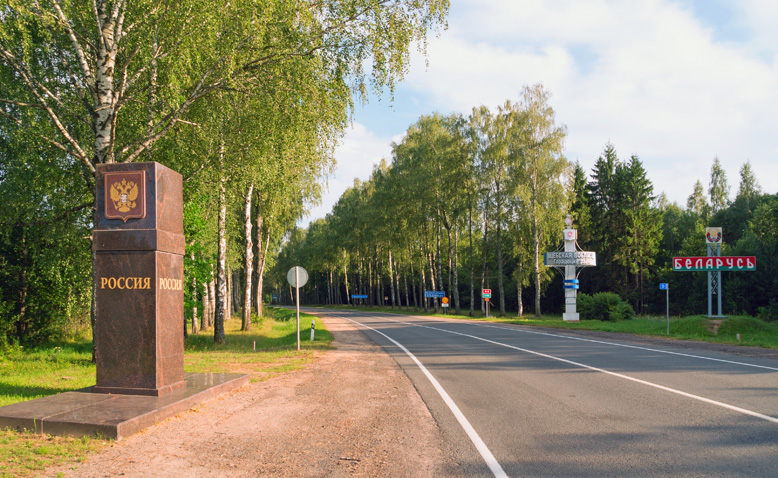 Russian-Belarussian border. Photo: Shutterstock
Russian-Belarussian border. Photo: Shutterstock
Although Belarusians remained favorable to cooperation with Russia after the annexation of Crimea, there is stronger support for a policy of neutrality than for a political union with another state or a supranational community (in one survey, 60 percent said they preferred neutrality over closer integration with either Russia or the EU).
To conclude, Belarusians feel they are holders of a distinct non-Russian identity, despite a highly pro-Russian attitude. Moreover, support within the population for a neutral and independent Belarus appears to have remained strong throughout the modern period.
Conclusion
The message from the political leaders during the entire post-Soviet period has been clear: the Russian and Belarusian people are ‘brothers’ and the relationship between the two countries is a strategic partnership. Despite this, Belarus lacks political will for deeper integration with Russia and is primarily interested in gaining benefits from the cooperation. This cooperation is however becoming less lucrative as Russia now lacks the resources to sponsor the Belarusian regime in order to keep it amicable and obliging.
In Russia, on the other hand, the interest in political integration is increasing, not least because it is seen by some as a solution to the “2024 problem”, and because of the increasingly expansionist foreign policy in general. These expansionist tendencies within the Russian elite act as a deterrent to a Lukashenka who is not willing to let go of his dominance.
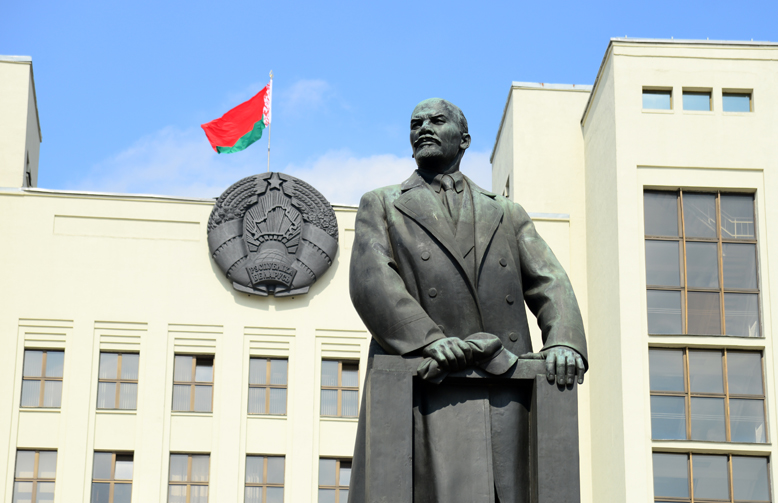 Monument of Lenin in front of Government House in Minsk. Photo: Shutterstock
Monument of Lenin in front of Government House in Minsk. Photo: Shutterstock
The current bilateral developments could lead to Belarus distancing itself from Russia. It is of course too early to speak of a real split as Belarus is still very closely tied to Russia economically. The political regimes in the two countries also show similarities that make it impossible for Belarus to join e.g. the European path without first carrying out radical reforms, something that the Belarusian president is clearly not prepared for.
What makes the present situation different is the altered nature of Russia’s political system. With the increasingly militant state rhetoric and after the events in Crimea and the Eastern Ukraine, a more violent scenario in Belarus cannot be excluded.
Some commentators claim taking control over Belarus would be too risky for Russia and is therefore not a rational measure. This is especially true given the relative ease with which Russia could simply amend its constitution, if securing Putin’s continued presidency after 2024 is the main objective. The rise in status of the Belarusian identity has also made it more difficult for Russian officials to convince Belarusians of siding with Russia.
Moreover, annexing Belarus would most likely not boost popularity of the regime among Russians. According to statistical data from 2015, most Russians do not harbor expansionist attitudes and are against further expansion of Russian borders (57 percent). Respondents willing Belarus to become a part of Russia amounted to 8 percent.
As long as Russia continues to develop in an authoritarian direction, a deeper conflict between Russia and Belarus seems increasingly plausible. Unless this development culminates in Belarusian incorporation, it may open new perspectives for Belarus in the long term since it has the potential to further strengthen Belarusian national identity as well as the economic and political independence of Belarus, therefore making it less susceptible to Russian influence.